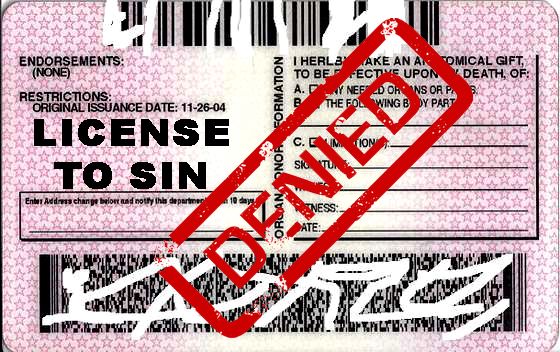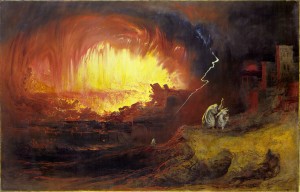Have you ever tried to actually love your enemies? It’s next to impossible, isn’t it? In Ephesians 3:18-21, Paul provides two ways that we can learn to love our enemies. These seem impossible as well, until we understand what Paul is actually saying about how to love our enemies.

But before we look at Ephesians 3:19-21, I want to answer a question from a reader about Matthew 10:28 where Jesus says, “Do not fear those who kill the body but cannot kill the soul. But rather fear Him who is able to destroy both soul and body in hell.”
Question from a Reader
One of the members of my online discipleship group is taking my online course about hell, and had a question regarding Matthew 10:28. Here is what he wrote:
Jeremy, I loved this course and it helped me out immensely, but I’m trying to figure out Matthew 10:28 with this new understanding of hell. Would you be able to explain this passage?
Matthew 10:28 says this:
And do not fear those who kill the body but cannot kill the soul. But rather fear Him who is able to destroy both soul and body in hell.
(#AmazonAdLink)  I have written about this text previously in connection with the parallel passage in Luke 12:5.
I have written about this text previously in connection with the parallel passage in Luke 12:5.
There are several translation issues about this verse which creates some deep divisions in Christianity regarding the meaning of what Jesus says here. The primary question about this text is in regards to whom Jesus is referring when He says “fear him who is able to destroy both soul and body in hell.” Who is the “him”? The NKJV version has the “him” capitalized, which shows that they think the pronoun is referring to God. However, there are many Christian leaders who think the pronoun is referring to Satan.
However, a third option might be that the “him” is referring to other human beings.
The Greek word used for hell in Matthew 10:28 is the word gehenna. This word does not refer to some horrible afterlife experience, but to an experience in this life where all that you hold dear and all that is valuable and important to you gets destroyed.
In my book (#AmazonAdLink) “What is Hell?” and the online course that goes with it, I says this about gehenna:
When the various texts are considered (cf. Matt 5:22, 29, 30; 10:28; 18:8-9; 23:15, 33; Mark 9:43-47; Luke 12:5; Jas 3:6), Jesus speaks of gehenna, or the Valley of Hinnom in a symbolic way … not to teach about what happens to some people in the afterlife, but rather to teach about what can happen to some people in this life. People who are sent to the Valley of Hinnom (usually because of crime or leprosy) lose their friends and family, and face a life filled with horror, decay, and destruction.
The warnings about gehenna are given by Jesus so that we do not destroy our health, life, family, friendships, and reputation in this life. Rather than live in the Valley of Death, God want us to enjoy everything He has given to us in this life.
In Matthew 10:28, Jesus says that being killed is not as big of a deal as having your life destroyed. If you die with your morals and values intact, and with your loved ones and friends thinking highly of you, the only thing you lose is your life. And since we know that life goes on for eternity, being killed for our beliefs is nothing more than a step from one life into an even better life.
What is much worse, however, is to have your life destroyed while you are still alive. That is, to lose your friends, your family, your health. To lose respect and honor from others. To lose your morals, values, beliefs, and convictions. To lose all that makes you you.
That is what we should seek to avoid at all costs.
It is far better to be killed for your beliefs than to abandon your beliefs and convictions.
Jesus is saying this: Don’t fear the one who can kill you, because death is not the end for us. But do fear those who can threaten and steal your values, morals, convictions, integrity, dreams, hopes, friends, family, job, health, and everything else of value in this life. That is who you should fear. That is who you should avoid.
This view of Matthew 10:28 and Luke 12:5 fits perfectly with my proposal in my book about hell that hell is not an afterlife experience of suffering and torture, but is rather an experience in this life of living contrary to everything that God wants and desires for us. In these verses, Jesus is warning us against those (including ourselves!) who can lead us into a hellish existence in this life.
You Cannot Love Your Enemies Until You Know You are Fully Loved (Ephesians 3:18-21)
Paul wants the church to lead the world into the way of peace. We are to be an example to the world of how to live in peace with our enemies. In Ephesians 2, Paul showed us how Jesus has done this. In Ephesians 3:1-13, Paul showed how he himself is doing this. And now, in Ephesians 3:14-21, Paul writes about how he prayers for his readers to do the impossible, namely, to love our enemies.
If it seems impossible to love our enemies, we need to know that in Jesus Christ, we can do what cannot be done. We can do the impossible. This is what we looked at last time when we studied Ephesians 3:14-17. Now, in Ephesians 3:18-21, Paul continues to write about what he prays for his readers, and he has two more impossible prayer requests, which are only possible through Jesus Christ.
Let me put these final two prayer requests in a bit of context for you.
Have you ever been told to get along with someone you can’t get along with? Was there ever someone at church whom you avoid Sunday after Sunday? If so, then you understand what the Ephesians were thinking here. Paul tells them in Ephesians 2 to live at peace with each other, and they are thinking, “But Paul, you don’t know what you are asking! I can’t get along with them. It’s … impossible! You don’t know what’s between us! You don’t know that he believes! You don’t know what she’s done! You don’t know what they said about me! I can’t live at peace with them! It’s impossible!”
So Paul prays for them here at the end of Ephesians 3. He says, “I know it’s impossible for you. So my first prayer request is that God will give you power to do what I’m asking you to do.” That’s the first prayer request. The request we saw previously in Ephesians 3:16-17. Prayer for power to do the impossible. Prayer for power to be at peace with those people you’d rather hate. A prayer request to do what you cannot do. That was the first prayer request. The second prayer request in Ephesians 3:18-19 is a prayer for knowledge.

C. Prayer for Knowledge (Ephesians 3:18-19)
Ephesians 3:18-19. … [that you] may be able to comprehend with all the saints what is the width and length and depth and height – to know the love of Christ which passes knowledge;
This prayer of Paul is not a “ho-hum” prayer! In Ephesians 3:16-17, Paul prayed that we would do what we cannot do, in Ephesians 3:18-19 he prays that we will know what we cannot know! He prays that you will be able…to know the love of Christ which passes knowledge. In other words, to know what cannot be known. To know what is impossible to know!
Paul is praying that we would know the love of Christ, which passes knowledge – which cannot be known. He somewhat describes this love back in Ephesians 3:18. He says that you may be able to comprehend – that means know – what is the width – that’s how wide it is – the length – that’s how long it is – the depth – that’s how deep it goes – and the height – that’s how high it rises. By using these terms, Paul is saying that the love of Christ is eternal, it’s infinite. It’s without beginning or end. It cannot be measured or contained. When Paul says width, he means it is wider than the universe. When he says length, he means it is farther than the east is from the west. The depth of Christ’s love – it’s deeper than the ocean. The height of God’s love is higher than God’s Word is above man’s word.
The vastness of God’s love is so difficult to explain – I think that’s why Paul cuts off what he was saying and says in verse 19 that this love cannot be known. How are you supposed to know what is infinite? Yet Paul prays that we would know it anyway. Paul has now prayed for two impossible things. Power to do what we cannot do and knowledge to know what we cannot know. We’re seeing a pattern, and the third request upholds this pattern.
D. Prayer for Filling (Ephesians 3:19b)
Ephesians 3:19b. … that you may be filled with all the fullness of God.
 How big is God? If you know some theology, you know that God is omnipresent. If we break this word down into two words. No matter where you are in the universe, God is there. He is everywhere. In fact, even when you get to the edge of the universe – where time and matter cease to exist, God does not stop there. He keeps going. That’s how big God is.
How big is God? If you know some theology, you know that God is omnipresent. If we break this word down into two words. No matter where you are in the universe, God is there. He is everywhere. In fact, even when you get to the edge of the universe – where time and matter cease to exist, God does not stop there. He keeps going. That’s how big God is.
How great is God? How powerful is He? Again, in theological terms, He is omnipotent. He has all power. With a mere thought, He could obliterate the universe. With another mere thought, He could recreate it. He can do whatever He wants, wherever He wants, whenever He wants, however He wants. (Thank goodness he’s a loving and merciful God – this kind of power would be terrible in the hands of a tyrant).
So with God’s omnipresence and omnipotence in mind, think of what Paul is praying for here in v. 19! He prays that you, as a teeny, tiny speck of flesh and bones, with life that is but a breath, made from dust, dying, decaying, sinful, insignificant piece of the vast universe, that you may be filled with all the fullness of God! The word fullness is the word pleroma, and it means fullness! When used of God, it means all of His divine attributes and perfection. Every bit of Him.
It is the term used of Christ in Colossians 2:9. Christ was completely God, right? Colossians 2:9 says that in Christ dwelt the fullness of God in bodily form! Fullness means fullness. Paul prays here for us to be filled with all the fullness of God. Try taking something bigger than the universe, something so big it is infinite, something so big it cannot be measured, and stuffing it into a space five or six feet tall, eighteen inches wide, and about a foot deep. Some of us have slightly different dimensions, but that’s not the point. How is something infinite supposed to fit into us? It’s impossible!
Even if the structure were much larger, it is still impossible to hold God in it. When King Solomon built the first temple, he too prayed a prayer on the day the temple was dedicated (found in 1 Kings 8), and he prayed:
O Lord, God of Israel, there is no God like you in heaven above or on earth below – you who keep your covenant of love with your servants who continue wholeheartedly in your way. You have kept your promise to your servant David my father, with your mouth you have promised and with your hand you have fulfilled it – as it is today – but will God really dwell on earth? The heavens, even the highest heavens, cannot contain you. How much less this temple I have built!
Solomon, the wisest man who has ever lived saw the truth that God could not be contained in any sort of building or structure. Yet somehow, God was. And that is what Paul prays here. That we may be filled with all the fullness of God. That is Paul’s third prayer request. An impossible request. We have seen three requests. All of them impossible. He prayed that we would do what we cannot do, that we would know what we cannot know, and that we would be filled with what we cannot be filled. Those are the three things Paul prays for.
Putting the Three Prayer Requests in Context
But these impossible prayer requests are the key to doing what Paul asks us to do … namely, love our enemies.
The truth of the matter is that we cannot begin to love our enemies … until we know that we are loved.
Have you ever realized that we were the enemies of God? When Adam and Eve rebelled in the Garden of Eden by choosing to go their own way, they took all of humanity with them into rebellion against God, thereby joining up with Satan in a rebellion against God. We are the enemies of God.
Yet God never stopped loving us. And while we were yet sinners, that is, while we were still the enemies of God, Jesus Christ died for us (Romans 5:8). That was the entire point of Ephesians 2:1-4.
So the first step in doing what cannot be done … namely, loving our enemies … is to know what cannot be known, that is, that we are fully and truly loved by God.
Why can it not be known? Because the love of God is infinite. It is without depth, height, width, or length. But we can begin to know the love of God. We can begin to experience the love of God. And only after we begin to know that which cannot ever be fully known, namely, how much God’s love us, will we begin to have love for our enemies.
Sadly, the love of God is something most Christians think they know and understand, but really don’t. We all pay lip service to the idea that God loves us, but few of us really believe it.
Most Christians think God only loves us as long as we are faithful and obedience. As long as we keep from sin. As long as we regularly read our Bibles and pray. As long as we have pure thoughts and stay away from temptation, and do all the things that good Christians are supposed to do.
But when we stray, well, God turns His back on us. He stops loving us. He turns away from us in shame and disgust. … This is what most Christians seem to think about the love of God.
Which just goes to show that most Christian know nothing of God’s love.
The truth about God’s love is that He loves you no matter what. God forgives you no matter what. Honestly, you could become Hitler and God will still love and forgive you. I know that statement is a shock to many people, but it’s true. And the fact that it’s a shocking just goes to show that we don’t know anything about the love of God.
No matter what you do or don’t do, God will never stop loving you. He will never turn away from you. He will never hide His face from you in shame. He will always be with you, will always forgive you, will always embrace and accept you. Until you begin to understand this, you will never understand God and will also never be able to show love for your enemies.
You can only begin to love once you know you are fully loved.
Two books I highly recommend about the love of God are (#AmazonAdLink) He Loves Me! by Wayne Jacobson and (#AmazonAdLink) The Misunderstood God by Darin Hufford. Both books will present the true, radical nature of God’s love to you, which is essential for you to start loving others.
And of course, even when we begin to know the love of God, love for our enemies still doesn’t come from ourselves. Love for our enemies is not within our power. This is why the third prayer request is so important, to be filled with all the fullness of God. When we love others, it is God loving them through us. When we love others, this love for others is the love of God working in and through us toward others.
This is the great secret and mystery of the church, that we are the hand, feet, and voice of Jesus. Jesus as Jesus is the incarnation of God, so also the church is the incarnation of Jesus. The love of Jesus is shown to a dying world through the church that if filled with the fullness of God’s love for the world (Cf. Ephesians 1:23).
So those are the three prayer requests of Paul…. He prays that we can do what cannot be done (love our enemies) by knowing what cannot be known (the love of God for us) and being filled with what we cannot be filled (the loving power and presence of God).
Does all of this sound impossible? If so, that is why Paul closes out Ephesians 3 with some final words of encouragement.
 E. The Encouragement (Ephesians 3:20-21)
E. The Encouragement (Ephesians 3:20-21)
Ephesians 3:20-21. Now to Him who is able to do exceedingly abundantly above all that we ask or think, according to the power that works in us, to Him be glory in the church by Christ Jesus to all generations, forever and ever. Amen.
Paul has prayed for three seemingly impossible things. To do what we cannot do. To know what we cannot know. To be filled with what we cannot be filled. But Paul remembered what Jesus told His disciples – with man, it is impossible, but with God, all things are possible (Matt 19:26).
So Paul says in Ephesians 3:20, “You think I’ve asked for impossible things? I haven’t even scratched the surface of what God is able to do.” He is – v. 20 – able to do exceedingly abundantly more. That phrase exceedingly abundantly comes from one Greek word, which is a double compound adverb. A double compound adverb is a very rare construction. This particular construction begins with a root word. The root word here is perissos. It means abundant, over and above, more than enough. In John 10:10, Jesus says that he came so that we might have life, and have it perissov – more abundantly. But then, Paul takes this word, perissos, which already means abundance, and adds not one,…but two words on top of it to make it a double compound adverb.
 He has had three prayer requests for the impossible, and then says God can not only do it, he can double do it – He can triple do it. He can run circles around it. He can do it with his eyes closed, and one hand tied behind his back. He can do exceedingly abundantly above all. If that’s not enough, look at the rest of verse 20. He can do above all that we ask or think! Paul says, God can do this and more. He says, if I can ask it, God can do it. If I can think it – or imagine it – God can do that too. In fact, God can do things I can’t even imagine! God can do things I can’t even think about!
He has had three prayer requests for the impossible, and then says God can not only do it, he can double do it – He can triple do it. He can run circles around it. He can do it with his eyes closed, and one hand tied behind his back. He can do exceedingly abundantly above all. If that’s not enough, look at the rest of verse 20. He can do above all that we ask or think! Paul says, God can do this and more. He says, if I can ask it, God can do it. If I can think it – or imagine it – God can do that too. In fact, God can do things I can’t even imagine! God can do things I can’t even think about!
Ephesians 3:21. …to Him be glory in the church by Christ Jesus to all generations, forever and ever. Amen.
All of this is done by the church, through the church, and in the church so that God will get the glory to all generations.
This is a concluding remark for the point Paul began all the way back at the end of Ephesians 1. After telling us about all the riches of our inheritance in Jesus Christ, Paul called us to be the fullness of God in every way in this world (Ephesians 1:22-23), so that we might be a witness to the principalities and powers of this world (Ephesians 1:21) to show the world a better way to live.
And now, through Ephesians 2 and Ephesians 3, Paul has shown us exactly how to do this. We are to follow the example of Jesus in loving our enemies, and even dying for them if necessary. As we do this, we show the world a better way to peace. We show the world the way of God in loving our enemies. This is the glory of God. This is the glory of the church. And this is how the love of God is manifested to the world.
It’s a revolutionary call, but Paul is not done. He will go on in Ephesians 4-6 to show more specifically how this calling is carried out by the church. We will pick up next time with the first verses of Ephesians 4 to see how Paul continues to call us peace, unity, and love for one another, so that that the world can learn from us and live in peace and unity as well.






 Paul says here that we used to live in transgressions and sins. The actual term here is peripateo – to walk about. So rather than “used to live” we should read it “used to walk.”
Paul says here that we used to live in transgressions and sins. The actual term here is peripateo – to walk about. So rather than “used to live” we should read it “used to walk.” In the rest of Ephesians 2:2, Paul uses three phrases to describe the way we used to walk. But all three terms point to the same reality. Let’s discuss the three terms and then I will identify the single reality that Paul has in view.
In the rest of Ephesians 2:2, Paul uses three phrases to describe the way we used to walk. But all three terms point to the same reality. Let’s discuss the three terms and then I will identify the single reality that Paul has in view. So the kingdom of the air can be none other than the demonic realm, which means that the ruler must be Satan (cf. 1 John 5:19; 2 Cor 4:4; Rev 12:9). We will discuss satan more in a bit.
So the kingdom of the air can be none other than the demonic realm, which means that the ruler must be Satan (cf. 1 John 5:19; 2 Cor 4:4; Rev 12:9). We will discuss satan more in a bit. The word does not refer to a being or entity that dresses in red and has a pointy tale and horns on his head. It also does not refer to an evil being who goes around trying to tempt people to sin. Oh yes, the spirit of satan brings temptation, but not exactly in the way we think.
The word does not refer to a being or entity that dresses in red and has a pointy tale and horns on his head. It also does not refer to an evil being who goes around trying to tempt people to sin. Oh yes, the spirit of satan brings temptation, but not exactly in the way we think.






 Listen to the podcast for the full discussion, but the bottom line truth is that whenever you think about criticizing a political opponent or person for their actions, first consider whether you would say the same thing if someone from your own political party had done the same thing. (Chances are, someone from your own political viewpoint HAS done the same thing… when that happened, what did you say or do?) If you would be silent, then remain silent now. If you spoke out, then feel free to speak out now.
Listen to the podcast for the full discussion, but the bottom line truth is that whenever you think about criticizing a political opponent or person for their actions, first consider whether you would say the same thing if someone from your own political party had done the same thing. (Chances are, someone from your own political viewpoint HAS done the same thing… when that happened, what did you say or do?) If you would be silent, then remain silent now. If you spoke out, then feel free to speak out now.
 Do you see the difference? In the teaching of eternal security, free grace is not a license to sin but is rather a warning against sin. We say “Yes, grace allows you to sin all you want, but when you really understand grace and sin, why would you want to?” Grace allows you to sin all you want just like owning a knife allows you to stab it into your leg. Yes, you can do this if you want to, but why would you want to?
Do you see the difference? In the teaching of eternal security, free grace is not a license to sin but is rather a warning against sin. We say “Yes, grace allows you to sin all you want, but when you really understand grace and sin, why would you want to?” Grace allows you to sin all you want just like owning a knife allows you to stab it into your leg. Yes, you can do this if you want to, but why would you want to? The first example of the Israelites in the wilderness clearly refers to physical death, rather than to eternal torment in hell. The example of the angels is more difficult, since we are not quite sure what event Jude has in mind. But many believe he is referring to the “sons of God” who had sexual relations with the daughters of men in Genesis 6, and were imprisoned as a result. Yet notice that while these angels are imprisoned in chains and darkness, they are not being tortured with fire. In fact, darkness and fire are mutually exclusive. And since angels are immortal, they cannot be killed. Therefore, they were imprisoned and are awaiting judgment.
The first example of the Israelites in the wilderness clearly refers to physical death, rather than to eternal torment in hell. The example of the angels is more difficult, since we are not quite sure what event Jude has in mind. But many believe he is referring to the “sons of God” who had sexual relations with the daughters of men in Genesis 6, and were imprisoned as a result. Yet notice that while these angels are imprisoned in chains and darkness, they are not being tortured with fire. In fact, darkness and fire are mutually exclusive. And since angels are immortal, they cannot be killed. Therefore, they were imprisoned and are awaiting judgment.
 According to historical accounts from the New Testament era, the Dead Sea was also known as the Lake of Fire, where there were frequent bouts of flame and smoke, burning sulphur, and where everything that went through it collected a tarnish of oily soot and grime (cf. Gen 19:24-28; Deut 29:23; Isa 34:9; Jer 49:17-18; Rev 20:10). In the days of Jesus, the valley was still smoking and smoldering, and they assumed it would go on that way forever. This is what Jude has in mind when he speaks of the cities suffering the vengeance of eternal fire. It is not hell, but is the ongoing, physical destruction and devastation that came upon those cities.
According to historical accounts from the New Testament era, the Dead Sea was also known as the Lake of Fire, where there were frequent bouts of flame and smoke, burning sulphur, and where everything that went through it collected a tarnish of oily soot and grime (cf. Gen 19:24-28; Deut 29:23; Isa 34:9; Jer 49:17-18; Rev 20:10). In the days of Jesus, the valley was still smoking and smoldering, and they assumed it would go on that way forever. This is what Jude has in mind when he speaks of the cities suffering the vengeance of eternal fire. It is not hell, but is the ongoing, physical destruction and devastation that came upon those cities.
 A reader sent an email today with these questions:
A reader sent an email today with these questions: For example, with question #1, I do not believe Jesus died in the place of others. I do not believe in “substitutionary” atonement.
For example, with question #1, I do not believe Jesus died in the place of others. I do not believe in “substitutionary” atonement.